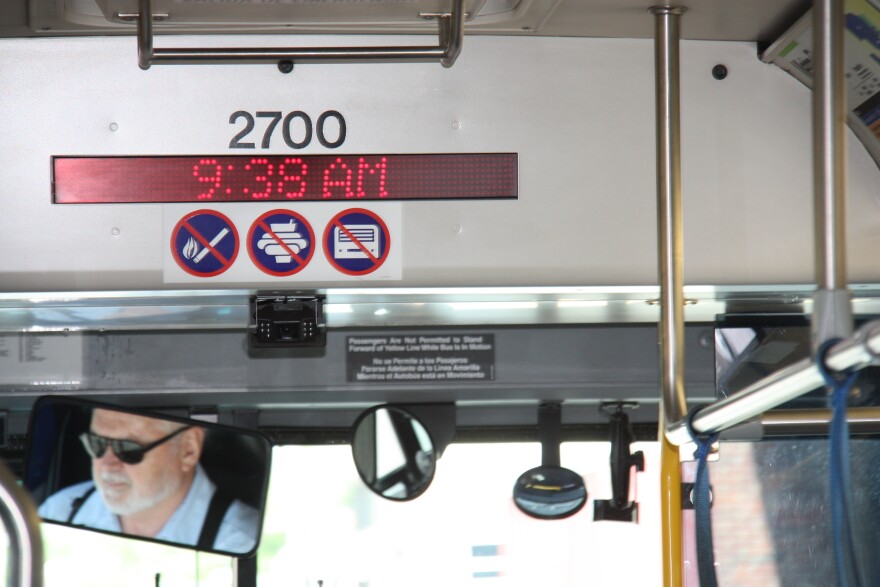Just after 7:15 a.m. in the morning, Kara McGowan rushes out of her house, carrying her baby, Airis, on one arm, a bulging diaper bag on the other. Her four-year-old, Addison, trails behind.
"We got eight minutes. Come on!" McGowan pleads. She doesn't want to miss her bus. She doesn't have a car, so her only option to get her kids to daycare and to herself to her job as a receptionist in Westport is to take public transit.
McGowan's bus rolls away from the intersection before she and the children arrive, so she reroutes them to catch the 12th Street bus across town.
She says it should be there at 7:46 a.m., but it tends to run late.
"Four minutes can make you miss your next bus, which can put you 30 minutes behind schedule," she says as she flips open her phone with her free hand to call the metro transit office to see if the bus is running on time.

Multiple buses
This is the first of four buses McGowan has to take to get to her job. A twenty minute car ride, it will take her the better part of two hours by the time she gets to work.
Her experience is not unusual — and for many the commute is more challenging. That’s because an increasing number of workers who depend on public transit – the majority of them African-American and low-income — are riding farther to work on a system that doesn’t connect them to where the jobs are.
As office parks and industries locate on the edges of cities, jobs are being created in the suburbs. Since the Kansas City metro is some 700 square miles and growing, those suburban jobs are a long way from the center city.
Tom Gerend, assistant director of transit for the Mid America Regional Council (MARC), says it’s a problem.
"Many services are still bringing workers from the suburbs to downtown as the core movement, (when) we're seeing continued growth in jobs outside of our urban core," says Gerend.
According to the findings of a 2011 Brookings Institution report comparing 100 metros of similar size to Kansas City, our public transit system is among the 10 worst. In addition, Brookings found only 18 percent of the jobs in the metro region are accessible to job seekers with less than a 90 minute commute on public transit.
The general manager of the Kansas City Area Transportation Authority, Mark Huffer,acknowledges it’s a serious issue not only for our existing economic landscape, but for growth in the future.
"(People) want to have one car per family or no cars per family. They choose where to live then find a job and move to that city," says Huffer. "For us to be competitive as a region, we’ve got to look at how we are moving people about and what public transit offerings are available"
Change is happening, gradually

Progress on a regional transit plan has been slow in coming. MARC and the Area Transportation Authority have set up a regional transit group to study cooperation among jurisdictions. Neighboring communities recently started to accept monthly passes from Kansas City riders.
But, with the millions of dollars in investment in a downtown streetcar, some are wondering when there might be a similar investment in moving people to jobs.
This look at Kansas City's east side is part of KCUR's months-long examination of how geographic borders affect our daily lives in Kansas City. KCUR will go Beyond Our Borders and spark a community conversation through social outreach and innovative journalism.
We will share the history of these lines, how the borders affect the current Kansas City experience and what's being done to bridge or dissolve them. Be a source for Beyond Our Borders: Share your perspective and experiences east of Troost with KCUR.





